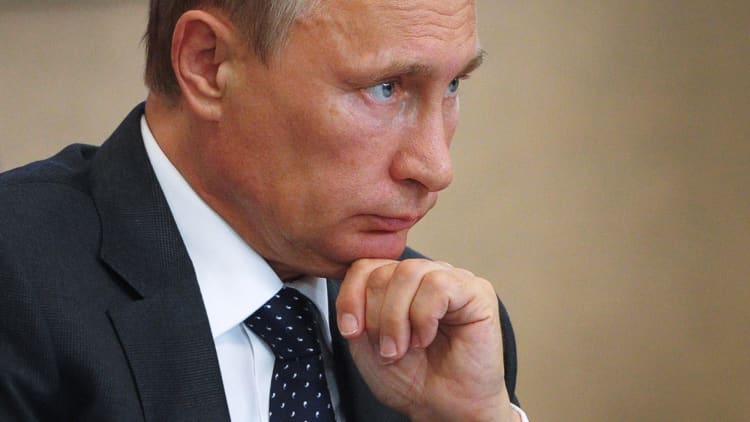Russia has banned U.S. poultry imports as part of a decree signed by President Vladimir Putin, the country's veterinary service said Wednesday. Putin earlier signed an order banning or limiting imports of agricultural products from countries which have imposed sanctions on Russia.
Putin ordered his government to come up with a list of goods to be banned for imports into Russia and to last one year, the Kremlin said. The order says the limits are being imposed "with the goal of guaranteeing the security of the Russian Federation" and calls for undertaking measures to guard against quick price hikes. The decision on U.S. and EU food import bans would be "quite substantial," the veterinary service said.
The move follows the latest round of sanctions against Russia imposed by the European Union last week, which for the first time targeted entire sectors of the Russian economy.
Read More
The U.S. and the EU have accused Russia, which annexed Ukraine's Crimean Peninsula in March, of fomenting tensions in eastern Ukraine by supplying arms and expertise to a pro-Moscow insurgency, and have imposed asset freezes and loan bans on a score of individuals and companies.

Some U.S. poultry producers, including Pilgrim's Pride and Tyson Foods, were still trading in positive territory after the announcement.
The threat of a Russian ban on U.S. poultry imports had agriculture companies alert to the risks of a conflict that's already roiled trading of crops ranging from soy, beef and fruit to California pistachios. American Farm Bureau Federation President Bob Stallman called the decision a "political move," adding that it hurt Russia's people.
"It is unfortunate that the biggest losers in this will be Russian consumers, who will pay more for their food now as well as in the long run," Stallman said.
Moscow had previously struck back against sanctions by imposing food restrictions, and would add U.S. chickens to Ukrainian soy and other products Russia has blocked since it seized Crimea: Australian beef, Latvian and Lithuanian pork, Moldovan fruit and Ukrainian juice.
Read MoreNew sanctions for Russia—here's where they'll hurt
Sanderson Farms, the third-largest poultry producer in the U.S., was among American agricultural companies preparing to respond if Russia carried out plans to restrict imports of U.S. poultry.
Russia was "using foreign trade as a political football" by threatening to limit poultry imports, Sanderson's Chief Financial Officer Mike Cockrell said. The Mississippi-based company was lining up other buyers for its chicken in case Moscow imposed a ban.
"We'd be crazy not to be making calls to alternative markets right now," he said.
Read MoreMoscow may force European airlines to fly around Russia
Russia's move to limit agricultural trade is seen as a sign the conflict with Washington is heating up. Russia imported about $1.3 billion in U.S. food and agricultural products last year, or about 11 percent of all U.S. exports to the country, according to U.S. Census data.
—By Reuters and The Associated Press. CNBC.com contributed to this report.

